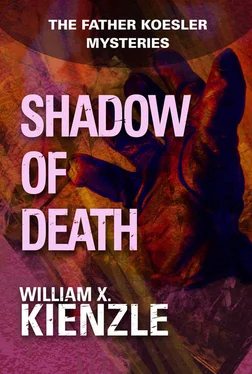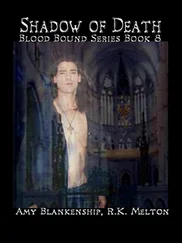The plane touched down smoothly and taxied toward the terminal.
“So,” said Koesler, relaxing his grip on the armrest, “what’s on your agenda for Ireland?”
“Actually,” Koznicki replied, “I believe I will have the opportunity to enjoy a few days of recreation before the religious ceremony on Saturday evening at St. Patrick’s.”
“Really? I didn’t think you would be able to relax until we get back to Detroit.”
“There is very little else to do for the next few days. There are no public ceremonies scheduled until Saturday evening. The Boyle clan will be traveling around the various counties sightseeing and visiting relatives.”
“Won’t there be danger even in that?”
“A minimal amount at most. There are no publicized itineraries or agendas. Even if an assailant wanted to attack the Cardinal, there would be no way of figuring out where he was going to be in time to plan an attack. And since many of the Cardinal’s relatives live in villages where everyone knows everyone else, the unexplained presence of a stranger would be immediately taken note of. Plus the fact that if one wanted an accessible target, the Cardinal will be at his most vulnerable at the ecumenical ceremony in St. Patrick’s.
“However, I have been in touch with Liam O’Connor, who is Commissioner of Police for the Republic of Ireland. He fully understands the situation and will take every precaution to provide security for the Cardinal, not only at the public ceremony but also throughout his stay in Ireland.
“All in all, I feel reasonably confident about the Cardinal’s safety, at least until the Saturday evening at St. Patrick’s.”
The plane rolled to a stop at the terminal gate.
“Well, then,” Koesler unfastened his seat belt, “do you have any plans between now and Saturday evening?”
“None to speak of.” Koznicki snapped open his seat belt but did not rise. He was in no hurry to deplane. Or rather he was in no hurry to stand crouched over while a motionless line of passengers blocked the aisle.
“What would you think of joining me?”
“Of course. If it is not troublesome, I would be pleased to join you.” After a pause, “What did you have in mind?”
“Well, this afternoon I plan to visit Trinity College Library, mostly to see the Book of Kells, and then I was going to see about tickets for a play this evening.”
“That sounds excellent.”
“You may not think the rest of my plans are as enjoyable.”
“Oh?”
“Tomorrow, I plan to rent a car and drive up to Boyle to see the town, the river, and the old abbey. My maternal grandfather came from there. A friend of mine is part owner of a pub in the neighboring village of Gurteen. Before we left Detroit, he urged me to spend the night there if I got as far as Boyle. How does that sound to you?”
“Just different enough to be very interesting. Are you sure there will be room for two at the pub?”
“Reasonably. But I’ll reconfirm that before we leave Dublin.”
“Strange,” the aisle cleared, Koznicki stood, “I have known you so long and so well. Yet I did not know of your Irish ancestry. Irish and German, are you?”
“Afraid so.”
“And not a drop of Polish?”
“No.”
“A pity. You might have had a bright future in the Church.”
IRELAND
By prearrangement, Koesler and Koznicki met at 3:00 p.m. in the lobby of their hotel, the Royal Dublin on O’Connell Street.
“How is your room, Inspector?”
“Fine; first-rate. And yours?”
“The best so far on this trip.”
“Now, where was it you said we were going first?”
“Trinity College.”
“Ah, yes: the Book of Kells.”
“Exactly.”
They took a few steps through the lobby. It was a relatively small, functional area with a convenient registration desk at the rear and just enough room for a small crowd to gather.
Seated at the left on banquettes against the wall were several nuns in the modified blue habit of the Religious Sisters of Mercy. And appropriately so, thought Koesler, since the order had been founded in Ireland, and the foundress, Mother McAuley, was buried here at the Mother House in Dublin.
The nuns were alike in their uniforms, their milk-white, rosy-cheeked complexions, and in the beatific smiles that appeared when they spotted Koesler’s clerical collar. Like a row of sailors sounding off, each sister in turn nodded happily in Koesler’s direction while mouthing, “Good afternoon. Father.”
Koesler smiled and nodded back.
Koznicki stopped just short of the revolving doors and looked about. “Father,” he said to Koesler, who had halted beside him, “since we arrived in Dublin—I know it has been only a short while—but have you had the impression of being watched . . . or followed?”
Koesler thought for a moment, but was unaware of any such perception. “I can’t say that I have.”
Koznicki glanced about again, then shrugged. “It is probably nothing. Perhaps I have been overly apprehensive lately.”
“That’s probably it, Inspector. You need to relax.”
They exited the hotel through the revolving doors, then stopped in the middle of a busy sidewalk on the very wide, historically significant, and statue-punctuated O’Connell Street.
“I know it’s within easy walking distance,” said Koesler, “but I’m not certain which way.”
A gentle—or soft—rain was falling steadily. If one stood in it long enough one would be soaked. But for the moment, the drops splattered off their hats and raincoats.
Koesler approached a passerby, a medium-sized man perhaps in his mid-forties. “I beg your pardon, sir, but could you tell us the way to Trinity College?”
The man squinted up at him through the rain. Spying the clerical collar, he whipped off his cap and stood at a sort of awkward attention.
“Well, Father, is it Trinity College you’re wanting? Actually, it’s not a hundred miles from here!”
“We suspected it was nearby.” Koesler, as he noted that the man rolled his r’s, wished he wouldn’t stand at attention bareheaded in the rain. “But we wondered in which direction. Could you tell us?”
“I could.”
There was a pause. Then, “Yes?”
“Well, now, Father, you’d be going down O’Connell Street here, the very street we’re on. Is that clear so far?”
“As a bell.”
“Well, then, Father, you’d be crossing the Liffey at the O’Connell Bridge. Are you acquainted with the Liffey then, Father?”
“Yes.”
“Of course you are. What could I be thinking of? Well, then, Father, you’ll be crossing the Liffey, as I’ve said, by the O’Connell Street Bridge. You’ll keep on going—a slight jog to your right it is, on Westmoreland Street. And then, Father, ahead on your right you’ll be seeing Dame Street. And right on the corner, on your abrupt right, you’ll see a large, white building.” He paused.
“And that’s Trinity College?”
“It is not.”
Throughout this one-sided colloquy Koznicki’s smile continued to widen.
“That would be the Bank of Ireland. Actually, directly across the street—there’s some vicious traffic and many’s the crash on that very corner—as I was saying, directly across the street would be Trinity College itself. Is that clear now, Father?”
“Crystal.”
His face radiated triumph. “Is it books you’d be looking for?”
“That’s right.”
The triumph glowed more brightly. “It’s the Book of Kells, then?”
“You’re very perceptive, sir.”
Raindrops trickled into the upraised corners of the man’s mouth.
Koesler hesitated, but finally decided, against his better judgment, to essay one more step. “Now, from Trinity, could you tell me how we get to the Dublin Gate Theatre?”
Читать дальше












